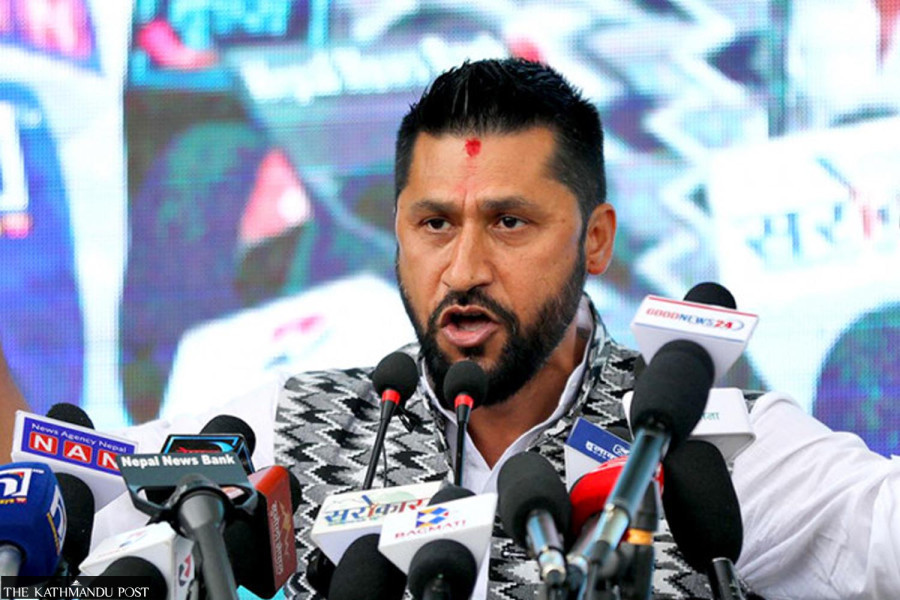Politics
Ruling parties say Rabi Lamichhane admitted guilt by offering to pay bail
Decision to deposit the security amount and fight the case from outside prison cannot be considered an admission of guilt, advocate says.
Post Report
Lawmakers from the ruling Nepali Congress and CPN-UML have alleged that Rastriya Swatantra Party chief Rabi Lamichhane has admitted guilt in cooperatives fraud cases by offering to pay restitution for bail, a charge his party and legal experts reject as his nationwide signature campaign—seen by some as judicial pressure—continues.
During the special session of the House of Representatives on Tuesday, UML Chief Whip Mahesh Bartaula said that Lamichhane’s willingness to pay restitution in order to secure bail was effectively an admission of guilt.
“By agreeing to pay restitution and requesting his release on bail, hasn’t the RSP president admitted to the offence? Once the offence is admitted, isn’t this signature drive just a farce?” Bartaula questioned.
Lamichhane, who has been in Rupandehi prison since April 4, filed the petition on August 4 seeking release upon submitting a bank guarantee equivalent to the amount attributed to him, but the court denied him a bail. Lamichhane had submitted bank security worth Rs27.4 million along with his application.
A single bench of Judge Narayan Prasad Sapkota, following a hearing on Lamichhane’s petition on Monday refused to release him from the judicial custody.
On Tuesday, ruling party lawmakers claimed that Lamichhane had admitted to the offence, citing the bail amount he deposited to secure his release from prison as the basis for their assertion.
Lamichhane has been charged with defrauding several credit cooperatives across the country to operate the now defunct Galaxy 4K television channel. Before joining politics in 2022, Lamichhane was associated with the TV as a managing director and hosted a programme.
Except for the Sano Paila cooperative case in Birgunj, all other cases against Lamichhane have entered judicial proceedings. The High Court is currently reviewing appeals regarding bail orders issued by district courts in connection with the Surya Darshan Cooperative in Pokhara, Sahara Cooperative in Chitwan, and Swarnalakshmi Cooperative in Kathmandu.
Since June 21, the party’s third anniversary, RSP, claiming Lamichhane's imprisonment is politically motivated, has organised a signature campaign across the country. Party leaders claim that the campaign will continue at least until Dashain-Tihar, the two biggest Hindu festivals which fall in October this year.
The party’s secretariat meeting held a few days ago claimed that more than 3.2 million signatures had been collected by that date.
While some legal experts interpret the RSP’s signature campaign while Lamichhane’s case is sub judice in court as an attempt to exert pressure on the judiciary, the party has rejected such allegations and continued the campaign.
Nepali Congress lawmaker Ishwari Devi Neupane, speaking in Parliament on Tuesday, also asserted that Lamichhane had admitted to the cooperatives fraud by agreeing to pay the bank the restitution amount. Neupane was a member of the parliamentary special committee that investigated the case of crisis-ridden cooperatives last year. In its report, the committee has suggested action against Lamichhane.
“Lamichhane admitted to the fraud and agreed to pay his share as per the restitution amount,” Neupane said. “While the case is still under consideration in court, a nationwide signature campaign is being run. Does this fall under the rule of law or not? Should this be considered a contempt of court or not?”
However, RSP lawmaker Shishir Khanal, who was also a member of the parliamentary panel tasked with investigating cooperative-related issues, disagrees with the ruling party lawmakers’ argument.
“Since party president Lamichhane was charged with a claim for restitution from the outset, his decision to deposit the restitution amount and fight the case from outside prison does not amount to an admission of guilt,” Khanal said.
Advocate Gandhi Pandit made a similar claim, arguing that agreeing to pay the restitution amount and fight the case from outside prison cannot be considered an admission of guilt.
Similarly, advocate Om Prakash Aryal stated that although politicians might interpret a post bail equivalent to the restitution amount and fight the case from outside prison as an admission of guilt, the law gives no room for it to be construed as such.
“Lamichhane’s decision to deposit the security amount and fight the case from outside prison cannot be considered an admission of guilt,” Aryal said.




 10.12°C Kathmandu
10.12°C Kathmandu














